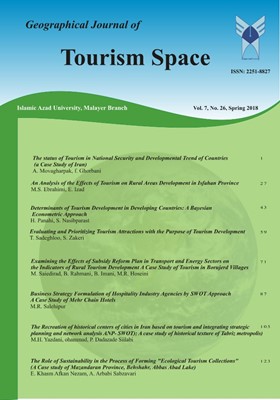The Role of Sustainability in the Process of Forming "Ecological Tourism Collections" (A Case study of Mazandaran Province, Behshahr, Abbas Abad Lake)
Subject Areas :
Erfan Khasm Afkan Nezam
1
![]() ,
gfh fgh
2
,
gfh fgh
2
1 - Masters student, Architectural Engineering, Engineering & Technical College, Islamshahr Branch, Islamic Azad University
2 - bfg
Keywords: Tourism Industry, Sustainable Development, Sustainable Tourism, ecological collections,
Abstract :
The prosperity of tourism in any geographic location, along with positive and negative socioeconomic consequences, has environmental impacts which if continued could cause irreparable damages. Sustainable environmental or ecological tourism is the expansion of the tourism industry and the attraction of tourists to the country using the existing resources in such a way that, while responding to the economic, cultural, social and legal requirements of society and the expectations of tourists, unity and integrity may be achieved. Cultural identity and environmental health can balance and provide the welfare for people and their guests in a balanced and continuous manner to an optimum level. The main design of the study is based on the analytical approach in a library-based and survey which analyzes the information related to the theoretical foundations of tourism industry; then, the foundations of sustainable tourism and its relationship with the factors shaping ecological tourism have been considered with the aim of promoting tourism collections in the understudy area based on the existing theories. Finally, the process of forming the ecological tourism complexes has been distinguished. The results of the research showed that the formation of ecological tourism complexes around natural-historical attractions in our country can be an effective step in sustainable tourism development; also, if "physical tourism planning" in Iran is done in a systematic way, it can create job opportunities and increase the value of currency.
پرانک، ژان و الحق، محبوب. 1380، گزارش لاهه: پیش زمینه توسعه پایدار(از فکر تا عمل)، ترجمه مصطفی مهاجرانی، فصلنامه علمی- پژوهشی محیط شناسی، 28(دوره 27): 85- 99.
2- فرجیراد، عبدالرضا و آقاجانی، سمیه. 1388، تحلیلی نو پیرامون گردشگری و جدیدترین طبقهبندی آن، فصلنامه علمی- پژوهشی جغرافیایی سرزمین، سال ششم(23): 61- 72.
3- علیزاده، کتایون. 1381، اثرات حضور گردشگران بر منابع زیست محیطی، فصلنامه علمی- پژوهشی پژوهشهای جغرافیایی(علوم انسانی)، شماره 44(بهار): 55- 70.
4- آقاجانی،سمیه. 1383، قابلیتها و محدودیتهای توسعه استان گیلان در زمینه گردشگری، همایش منطقهای علمی- پژوهشی گیلان و برنامه چهارم توسعه اقتصادی، اجتماعی و فرهنگی ایران. رشت، 93- 96.
5- تولایی، سیمین و کرده، نعمت و رحمتی، حسن و حاجیتاش، شریف. 1392، بررسی تأثیر نقش گردشگری بر اقتصاد روستایی(نمونه: روستای گوگتپه از توابع شهرستان مهاباد)، کنفرانس، دانشگاه آزاد اسلامی واحد تبریز، تبریز، 27- 28 آذرماه.
6- زیاری، کرامتاله و مردانی، علی. 1394، امکانسنجی ایجاد و برنامهریزی کمپهای تفریحی- توریستی در منطقه کوهسار، همایش بینالمللی معماری، عمران و شهرسازی در هزاره سوم، تهران، کانون سراسری انجمنهای صنفی مهندسان معمار ایران.
7- شمس، مجید و بیرانوندزاده، مریم و حاتمی، مجتبی. 1390، نقش اکوتوریسم در توسعه شهرهای ساحلی(مطالعهی موردی: استان هرمزگان)، همایش ملی قشم و چشمانداز آینده، سازمان منطقه آزاد قشم، 25- 26 اردیبهشتماه.
8- شمس، مجید و مطلبیان، خسرو. 1393، گردشگری و نقش آن در اقتصاد مقاومتی، دوازدهمین کنگره انجمن جغرافیایی ایران با محوریت آمایش سرزمین،الگوی ایرانی اسلامی، نجف آباد، دانشگاه آزاد اسلامی واحد نجف آباد، 13- 14 اسفندماه.
9- قبادیان، وحید. 1381، راهنماى طراحى ساختمان در چهار اقلیم ایران، دومین همایش بهینهسازی مصرف سوخت در ساختمان، تهران، 6-7 اسفند، سخنرانی.
10- مفیدی شمیرانی، مجید و خدابخشی، شهره. 1380، ساختوساز پایدار در ارتباط با معماری سنتی ایران، سومین همایش ملی انرژی ایران.
11- الوانی، سیدمهدی و پیروزبخت، معصومه. 1385، فرآیند مدیریت جهانگردی، چاپ اول، انتشارات دفتر پژوهشهای فرهنگی، تهران.
12- بانیمسعود، امیر. 1392، پست مدرنیته و معماری(بررسی جریانهای فکری معماری معاصر غرب 1960- 2000)، چاپ چهارم، نشر خاک، اصفهان.
13- زاهدی، شمسالسادات. 1385، مبانی توریسم و اکوتوریسم پایدار: با تأکید بر محیط زیست، چاپ اول، انتشارات دانشگاه علامه طباطبایی، تهران.
14- طرح جامع توسعه گردشگری استان تهران. 1385.
15- کاظمی، مهدی. 1385، مدیریت گردشگری، چاپ اول، انتشارات سمت(سازمان مطالعه و تدوین کتب علوم انسانی دانشگاهها)، تهران.
16- نوبخت، محمدباقر، پیروز، ا، مرکز تحقیقات استراتژیک(مجمع تشخیص مصلحت نظام)، معاونت پژوهشی دانشگاهآزاد اسلامی. 1387، توسعه صنعت گردشگری در ایران؛ موانع و راهکارها. چاپ اول، انتشارات دانشگاه آزاد اسلامی(معاونت پژوهشی: دفتر گسترش تولید علم)، تهران.
17- ادوارد، برایان. 1393، رهنمونهایی به سوی معماری پایدار، ترجمه ایرج شهروز تهرانی، چاپ دوم، انتشارات مهرازان، تهران.
18- سازمان جهانی گردشگری. 1379، برنامهریزی توریسم در سطح ملی و منطقهای، ترجمه دکتر بهرام رنجبریان و محمد زاهدی، انتشارات جهاد دانشگاهی، اصفهان.
19-گی، چاکوای و فاسیولا، ادوآردو. 1377، جهانگردی در چشماندازی جامع، ترجمه علی پارساییان و سیدمحمد اعرابی، چاپ اول، انتشارات دفتر پژوهشهای فرهنگی، تهران.
20- Clark, T. N.,(2004), The city as an entertainment machine. Oxford, UK: Elsevier Reisinger.
21- Florida, R., (2002), The rise of the creative class. New York, NY: Basic Books.
22- Irwin, Alun (2001), Sociology and the Environment, Cambridge: Polity Press.
23- Jansen-Verbeke, M., (1986), Inner city tourism: resources, tourists, and promoters. Annals of Tourism Research, Vol. 13, No. 1, pp.79-100.
24- Low, A., 1993, A model of tourist attraction research. Annals of Tourism Research, Vol. 14, No. 4, pp. 553–575.
25- Mill, R. C. & A. M. Morrison, (1992), The Tourism system: an introductory Text, 2nded. Prentice Hall, New jersey.
26- Oh, C. O., (2005), The Contribution of Tourism Development to Economic Growth in the Korean Economy, Tourism Management, Vol. 26, No. 1, pp. 39-44.
27- Steele, J. (2005), Ecological Architecture: a critical history, London: Thames & Hudson.
28- Soleimanpour, H., (2006): Nature Based Tourism: A Draft International Covenant, Center for Sustainable Developmen (CENESTA) publication, TEHRAN, IRAN.
29- Samuel Seongseop Kima,-, Dallen J.Timothyb, Hag-Chin Han, 2007,”Tourism and political ideologies: A case of tourism in North Korea”, Tourism Management (28), 1031- 1043.
30-WTO. 2006, Year book of tourism statistics. Madrid: World Tourism Organization.
_||_

